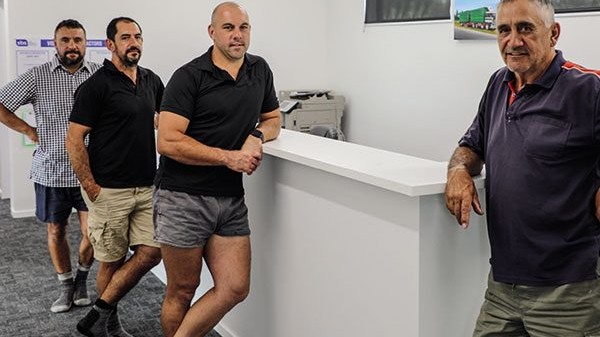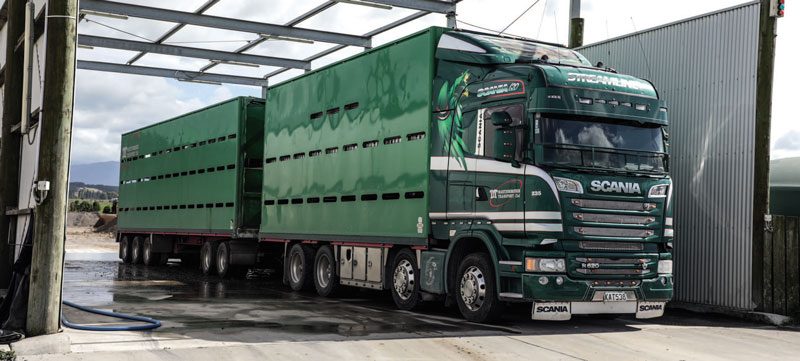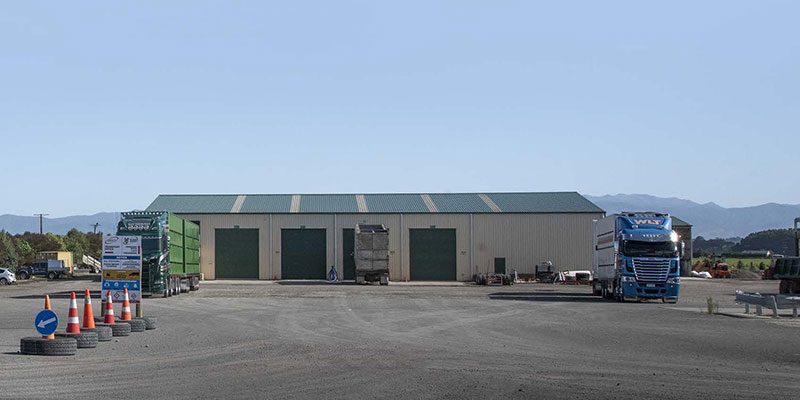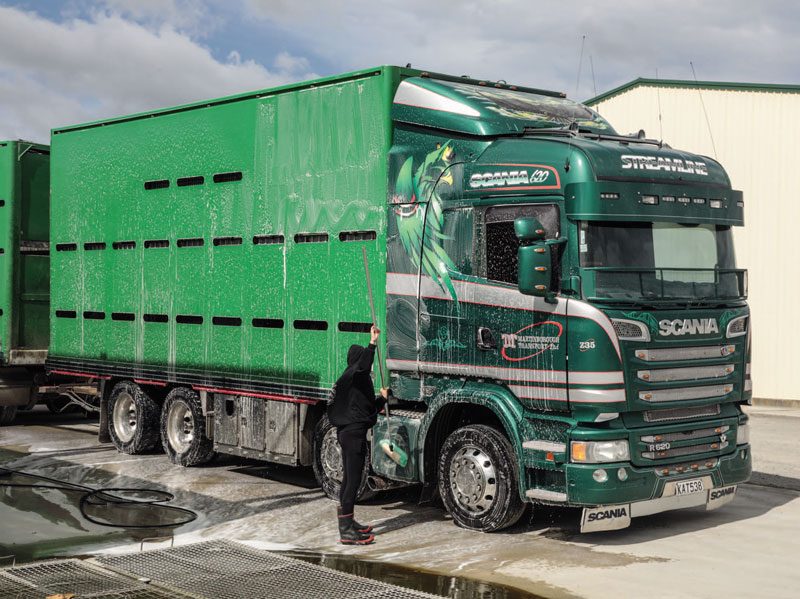
How often does it happen? Aspirational trucks and operations? You approach ‘stammer-y’ and star-struck, yet all you find are humble, hardworking, welcoming folk.
Few tick the above boxes more than the Hawkins brothers at Martinborough Transport. They love what they do; they love trucks. They also welcome and enjoy the company of anyone who shares their passion or shows a genuine interest in them or the industry.
“We have everything from Class 2 to Class 5,” says 42-year-old Josh Hawkins, the middle brother of the trio and largely responsible for the commercial and administration side of the business. “Shortly, we’ll also have a Class-5 single deck combination – that means a truck and trailer without the worry of the upstairs cargo, so a nice transition. Yes, we lose about half of those we train to the wider industry, but at least it’s adding to the pool; it’s a contribution. And, hey, we often see them come back.”
Josh’s elder brother is 47-year-old Daniel. Having served nine years in the army and a qualified diesel mechanic, he looks after plant, maintenance and the company’s stand-alone workshop and COF facility, MT Vehicle Services, also located at head office on Lake Ferry Road. Then there’s Jared. The best way to explain the youngest Hawkins brother at 36, is to ask his two older brothers. As truck-mad as they all are, regularly leaping aboard a green steed, Jared’s the one who takes the truck-crazed cake. “Did he go to college?” asks Daniel tongue-in-cheek, looking at Josh. They both laugh. “Not much,” says Josh. “He got his licence with that dispensation thing somehow. He was only 17, I think.”
Jared sits atop daily operations, and let’s say he’s more than willing to help in the field with little encouragement. In fact, as we sat down together to chat about things, Jared was out in his happy place.
Sister Carlene, the second eldest at 45, “didn’t like the cold”, as Josh put it in classic Hawkins fashion, and lives in Australia.
The business today runs 35 trucks, including four owner-drivers, with physical locations in Martinborough, Fielding, Masterton, and five trucks based in Ashburton under the Mid Canterbury Transport brand, a 50%-owned operation with Hayden Lyall and Trevor Fairbrother. The work profile is rural cartage as it was when parents Trevor and Carol Hawkins started the business in 1981 under the name TJ Hawkins.
The fleet is certainly high-profile, operating high-end gear with facilities that reflect ongoing reinvestment. The current Lake Ferry Road head office succeeded the original 47 Jellicoe Street depot located in Martinborough proper. Ten years ago, today’s home base was an undulating paddock on the outskirts of town. Yet, today, there are extensive yards, a big fertiliser shed, large workshops, cattle yards, loading ramps and a stage for sides. The crate wash is huge and can take two units; beside it is the fleet wash. Alongside the workshops is a weighbridge, and in one corner out front are the old offices up on pallets and jacks awaiting a planned relocation to Masterton in the medium term. On the other corner is the brand-new administration block with fully equipped drivers’ quarters attached.

“When the South Island guys are up or someone based elsewhere are laid over here, the dongas are a facility they can utilise,” says Daniel. “Martinborough’s taken off over the past few years and the area is becoming the place to live for the swanky Wellington set. It’s made accommodation, permanent and temporary, a bloody nightmare.”
It’s an impressive set-up, regardless of the angle you’re coming from: the fleet, the facilities and three brothers who can enthusiastically work together daily with a light-hearted approach. It seems a happy yard full of happy people. Yet, at the same time, there’s no shortage of ambition, focus and planning. You wonder, ‘What’s the key?’ And then in drives an old Ford Courier and out hops a bloke. He’s an older bloke and cuts a sinewy figure at about 5ft 10in. He’s dressed in working man’s attire – boots, shorts, a polo shirt and a cap. He’s smiling and carrying the broken windscreen from a digger with a ‘munted’ windscreen wiper hanging off it. Everyone acknowledges him. “G’day Trevor”, “Hi Trevor”. Then Daniel: “G’day, Dad. What’s that?”
“Oh, a post smashed it.”
There are introductions, smiles and handshakes. The smile disappears for just a moment when the ‘photo’ word comes up.
The Hawkins family lived at 14 Malcolm Street in Martinborough. Trevor Hawkins drove for Martinborough Freighters, a company formed in the mid-1960s with the amalgamation of several local transports. It operated from the depot on 47 Jellicoe Street, itself originally the home of pre-war business Chapman Carriers, which was bought by Martinborough Carrying, part of the unification of carriers mentioned to form Martinborough Freighters.
When Martinborough Freighters fell on hard times, Trevor jumped at the opportunity to have a go himself. Josh and Daniel can’t remember if he bought, borrowed, or hired the 210hp Ford D1000 that got him going, but in 1981, that’s exactly what he did. “I think it was a three-decker, too,” says Josh. Anything onto or off-farm was the service promise, and Trevor carted his first load of sheep to Waingawa on the western side of Masterton in May of that year.
The son of a sheep shearer and scrub-cutter, hard work was in Trevor’s DNA. He didn’t take long to earn a solid reputation for service on the one hand, which meant he was wearing out the Ford on the other. It was replaced with a 310hp Mitsubishi FV315 in a matter of months.
“Carting fert to airstrips in the day, then put the crates on and cart cattle at night, then load wool in the early morning,” says Daniel, who remembers it all as the firstborn. He was five years old when it all went down. “Helping Dad was just part of life for us kids growing up. He was on his own and anything we could do was a help, even answering the phone. You never let the phone ring,” he laughs. “We’re the same here now.”
Trevor parked at the 47 Jellicoe site initially with the plan to develop a shed and parking at Malcolm Street. Not all the local transports had jumped on board at the formation of Martinborough Freighters – McLeod and Garrity and Days Transport among those who abstained. The former had taken on the 47 Jellicoe site. Trevor took the opportunity to partner with Keith McLeod of McLeod and Garrity, buying 60% of that operation, and as consequence, stayed at 47 Jellicoe.


Eighteen months into the adventure, the Mitsubishi yielded to some real firepower in the form of an International T-Line, joined in time by a legendary truck in the company’s history – a Cat-powered 8×4 S108 Foden, a painting of which proudly hangs behind reception today.
In 1987, Trevor bought the remainder of the McLeod and Garrity business, rebranding to Martinborough Transport. That doubled the size of the fleet, both entities running about three units. The next decade was just a case of hard work and service above all else, and included the purchase of Days Transport, again doubling the size of the operation, bringing the fleet count to about 10 trucks.
Of course, as the children grew up, they found their own path for a time… except for Jared. For him, it was trucks, trucks and more trucks. Daniel served in the army and Josh went to university. Of course, during leave and holidays, it was a different kind of army or educational institution in which the two older siblings served… the green one.
It was about 2004 when they started to drift home. That began the journey to a decision Trevor would make, the most significant move in the company’s modern history, and a true sign of the man’s character. He did something that set up the business for what it is we see today, and answers the question above: ‘What is the key to it all?”
He pretty much said this: “Right-oh. There it is. Now you make something of it.”
Succession, or lack of it, is the single-most difficult and potentially crippling aspect of business. Having what it takes to start a business is often at odds with the humility required to hand it on. At 55, Trevor encouraged and prompted his three sons to start taking over the reins. The ultimate demonstration of confidence from parents to their offspring, its effect on the self-esteem of the next generation is immeasurable.
“We thought if he could do it with one head and one set of shoulders, surely we can with three,” says Daniel laughing. Then Josh adds a comment, fully endorsed by his brother.
“Not once has he ever said, ‘Oh, you’re doing that wrong,’ or ‘You shouldn’t do that,’ or ‘I wouldn’t do that.’ He got out at a time when he’d be around if we needed to chat or ask for advice. And that’s exactly how it’s worked. All he’s done is encourage us. I remember when we bought the first Scania – it was a big deal and we asked him what he thought. ‘Looks like a good deal to me. You should buy two!’”
Funny anecdote time. Trevor took a truck and digger from the business as part of his exit. It gave him something to do in ‘retirement’ and gave the brothers some space. Of course, he grew that to three diggers and three trucks – eventually selling two, keeping one digger and one truck… for something to do in retirement.
“At 68, he’s almost got it right,” laughs Josh. “But he’ll still work all hours if a job needs finishing – it’s just in him to never leave it unfinished. He and Mum have some baches at Cape Palliser and they love being out there. He loves helping the locals.”
To date, the big acquisition in the brothers’ era was bringing Wairarapa Livestock Transport (WLT) into the fold in two stages, half in 2018 and the remainder in late 2019. But there’s been another move of a non-acquisition nature that has also impacted the business positively, one that made it a truly national brand.
“Rural cartage is a very seasonal thing here,” says Josh. “Traditionally, June and July are quiet. That’s fine in June, the drivers need the rest. But then what usually happened for the next four to six weeks was maintenance on crates – sanding, welding, painting, or work around the yard. That didn’t help with retention – they might get ‘scratchy’ or look elsewhere. The other scenario was drivers who go elsewhere in the off-season and do other things, deciding not to come back. We wanted to find ways of keeping the assets moving and drivers in the roles they wanted to be in. We looked further out, in areas where seasons were different, or where stock was moving all year round. That’s really where the interisland thing originated and what led to Mid Canterbury Transport, our Ashburton-based business.”
Another area in which Daniel, Josh and Jared wanted to try a new approach was the fleet itself. Daniel picks up the thread.
“If a salesman turned up and fluked a moment when Dad wasn’t flat out, when he was happy with the business, and the deal was sharp, the chances are he’d have left with a sale. That meant we ended up with a rainbow fleet, and that doesn’t always leave you in a strong leveraging position with suppliers. We’ve tried to keep it tighter, even though different marques have trended at different times.”
Today, the front-line units comprise Scania, Kenworth and Freightliners, with some still in the distinctive blue and white of WLT.
The first Scania arrived in late 2011. Cable Price’s Craig Pepperell brought a demonstrator into the yard. “We took it for a spin and thought, ‘This is a bit of all right,’” says Daniel.
Cable Price had a good lower North Island presence at the time, and support was strong.
“Deon Stephens was in charge of parts back then in Wellington. He’s a big kahuna at Scania now, but we formed a great relationship with him.”
The Hawkins brothers are realistic about trucks and say while the Scanias have been a strong product for them, at the end of the day, they are machines and machines need support.
“It’s not the sale; it’s what happens after the sale that counts,” says Daniel. “For us, Scania are back at the level of service Cable Price was able to give us when the change was made and Scania took on the brand themselves. They’ve worked hard to get there, and now offer good support and flexibility in the servicing schedule. If a truck is booked in here but away from home at the time of its service, we can invariably get it in close to where it is. For the long-distance trucks, we run Scanplan, but it doesn’t stack up for the regional trucks not doing the big kilometres.”
Mention trailers and only one name comes back across the table – the product of the Wairarapa’s own famous trailer-building son, Trevor Jackson, and his team at Jackson Enterprises. Total Stockcrates are the preferred supplier of animal containment, with some Delta also in the mix. “They are a great product and local also.”
Of course, the issue is, truck-nuts aside, Martinborough could do what it does with a bunch of white Hinos. Yet it builds spectacular units. “That’s easy,” says Josh. “You get the good gear, and you’ll likely attract good, interested and conscientious drivers that can do the job properly. That has a flow-on effect – hopefully – with the clients, and word-of-mouth is a big thing in the rural game. More work generates more funds, and allows you to build good gear. Hopefully, it’s a self-perpetuating cycle.”
Trucking is not getting any easier – still frequently active at the coalface, the Hawkins brothers know this better than most. “I was out last night,” says Daniel. “I’d forgotten how busy SH1 is. It’s crazy out there. And the roads… jeez, they’re stuffed, eh?”
As members of Ia Ara Aotearoa Transporting New Zealand, their view on compliance is one of adapting early. “The rule-makers love making them,” says Daniel. “You have to figure it out early and get on board. It’s no use waiting.”

Josh continues: “An audit was done of lower North Island stock carriers a couple of years ago. There were no fines or consequences for us, but we were asked to go on electronic logbooks. They told us everyone would be on them within a couple of years. That hasn’t happened, but you can see it’s coming. We figured we may as well get going with it and understand it, rather than scramble sometime down the track. It’s interesting because it removed a level of ‘noise’ from the business. For example, there’s no issue chasing timesheets come payday – all the information is right there for the administration staff. That’s something we hadn’t twigged to at the time.
“The one that irritated was the back-rub rules. There was no amnesty at all, just the notification one day and fines the next. That was very poorly handled in terms of impact on the carrier as a key stakeholder. There was no time to assess and manage your situation.”
Like every business in the country, the current economic climate is prompting a review of systems and processes. Increasing interest rates and inflation mean every input cost has gone up. “Trucks, trailers, crates – they’ve all climbed significantly,” says Josh. “It might mean TCO and ROI shift also. We work to a 10-year plan when it comes to replacements, and 1,000,000km has been about the point where we move a truck on to avoid increased R&M. That might move a year now. Who knows? A bit of extra maintenance might be less than the capital increase.”
“Air suspensions have impacted things markedly too,” says Daniel. “Especially trailer and crate life – they just last longer. You’d hear the old Hinos coming home when they were in town, banging and crashing. Now the Scanias pull in, and that’s the first you know. With full air right through, it’s even more of a gain. If you look after them, now a trailer and crate might see out three trucks.”
Like their father, and people whose cloth is cut in a similar manner, the Hawkins brothers are slightly bewildered at the thought of their operation being something overtly different or special. For them, their upbringing, and the way they approach the staff, customers, assets and plant, is their normal.
The company is an equal- opportunities employer for anyone interested in the industry, the business, or trucks.
It’s got nothing to do with who you are, but rather willingness to learn. Lucy, Jo and Piper – the ‘girls can do’ division – will attest to that. “Mate, they’re awesome,” says Daniel. “It’s not easy work. Loading a truck and trailer of sweaty lambs on a hot day or hosing out a shitty unit, it’s better than any gym workout, I’ll tell you. And they’re good on the gear also.”
The continual reinvestment in plant and facilities indicates to staff, current and future, that something lasting and real is being built here. This is no investment bank, ‘cut and run with the spoils’ operation; this is business for all the right reasons. That sentiment permeates the company. The folk we talked to felt part of something.
Daniel, Josh, and Jared are acutely aware of the opportunity their dad Trevor presented in 2009. And there’s an underlying sense when chatting with them that his gesture must be honoured by all the effort they can muster.
As you would expect, all three brothers emphasise the need to acknowledge all those who make the company what it is.
“We’re lucky to have the staff we have, the customers, and the suppliers we deal with,” says Daniel. “Our family are an endless support to us, but our staff are also. You can’t do what you do, or what you want to do without the right people around you – without good folk around you.”
Three truck-mad lads raised in a trucking business who could just as easily be found in the cab of one of their spectacular machines as in their slick-yet-unpretentious head office. They know their business, their staff and their customers at the front line. As a driver, it could be a Hawkins out there with you at 3am loading sheep. As a customer, it could be a Hawkins who leaps from the cab to load your 14 yearlings. As a supplier, it could be a Hawkins who arrives in a truck to have some work done. That, in itself, is 21st-century business gold.
And hey… if they’re not around, there’s always that older bloke in the Courier ute who just drove in. He’s always good for a yarn.
‘So who’s he?’ you ask. Let’s just say giants come in all sizes, and mana is never something you wear. Just go meet him.
Read more
Pictures tell it all
0 Comments3 Minutes
From the get-go!
0 Comments9 Minutes
Never losing sight
0 Comments39 Minutes








